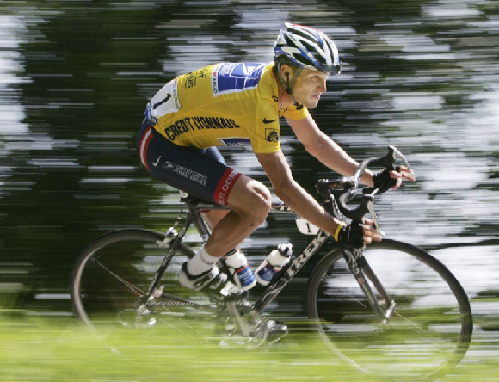
Armstrong loses titles, cast out
Shanghai Daily, October 23, 2012
-

Lance Armstrong was stripped of his seven Tour de France titles and banned for life by cycling's governing body yesterday following a report from the US Anti-Doping Agency that accused him of leading a massive doping program on his teams.
The International Cycling Union (UCI) President Pat McQuaid announced that the federation accepted the USADA's report on Armstrong and would not appeal to the Court of Arbitration for Sport.
"Lance Armstrong has no place in cycling and he deserves to be forgotten in cycling," McQuaid said at a news conference. "This is a landmark day for cycling."
The decision clears the way for Tour de France organizers to officially remove Armstrong's name from the record books, erasing his consecutive victories from 1999-2005.
Tour director Christian Prudhomme has said the race would go along with whatever cycling's governing body decides and will have no official winners for those years.
Armstrong's representatives had no immediate comment.
USADA said Armstrong should be banned and stripped of his Tour titles for "the most sophisticated, professionalized and successful doping program that sport has ever seen" within his US Postal Service and Discovery Channel teams. He also loses all race results achieved since August 1998.
The USADA report said Armstrong and his teams used steroids, the blood booster EPO and blood transfusions.
The report included statements from 11 former teammates who testified against Armstrong, including that he pressured them to take banned drugs.
"I was sickened by what I read in the USADA report," McQuaid said, singling out the testimony of former teammate David Zabriskie. "The story he told of how he was coerced and to some extent forced into doping is just mind boggling."
Armstrong denies doping, saying he passed hundreds of drug tests. But he chose not to fight USADA in one of the agency's arbitration hearings, arguing the process was biased against him.
USADA's report, released earlier this month, was aimed at showing why the agency ordered the sanctions against him.
"At the moment Lance Armstrong hasn't admitted to anything, yet all the evidence is there in this report that he doped," McQuaid said.
Former Armstrong team director Johan Bruyneel is also facing doping charges, but he is challenging the USADA case in arbitration.
On Sunday, Armstrong greeted about 4,300 cyclists at his Livestrong charity's fundraiser bike ride in Texas, telling the crowd he's faced a "very difficult" few weeks.
"I've been better, but I've also been worse," Armstrong, a cancer survivor, told the crowd.
While drug use allegations have followed the 41-year-old Armstrong throughout much of his career, the USADA report has badly damaged his reputation.
Longtime sponsors Nike, Trek Bicycles and Anheuser-Busch have dropped him, as have other companies, and Armstrong also stepped down last week as chairman of Livestrong, the cancer awareness charity he founded 15 years ago after surviving testicular cancer which spread to his lungs and brain.
Armstrong's astonishing return from life-threatening illness to the summit of cycling offered an inspirational story that transcended the sport.
However, his downfall has ended "one of the most sordid chapters in sports history," USADA said in its 200-page report published two weeks ago.
USADA also thinks the Tour titles should not be given to other riders who finished on the podium, such was the level of doping during Armstrong's era.
The world's most famous cyclist could still face further sports sanctions and legal challenges.
Armstrong could lose his 2000 Olympic time-trial bronze medal and may also possibly be targeted with several civil lawsuits - from ex-sponsors or even from the US government.